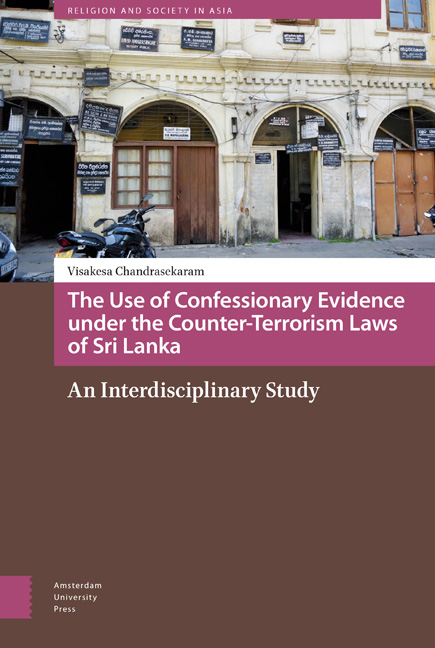 Use of Confessionary Evidence under the Counter-Terrorism Laws of Sri Lanka
Use of Confessionary Evidence under the Counter-Terrorism Laws of Sri Lanka Book contents
- Frontmatter
- Dedication
- Contents
- 1 Do Tigers Confess?
- 2 Rebellion and Martyrdom
- 3 Facts, Falsities, and Fictions
- 4 Punitive Interrogation of Tamil Tiger Suspects
- 5 Judgement of the Terrorist Against the ‘Formula of Justice’
- 6 Fantasies, Fictions, Myths, and Denials about Tamil Tigers’ Confessions
- Appendix
- Acronyms
- Acknowledgements
- About the author
- Bibliography
- Index
2 - Rebellion and Martyrdom
Published online by Cambridge University Press: 10 December 2020
- Frontmatter
- Dedication
- Contents
- 1 Do Tigers Confess?
- 2 Rebellion and Martyrdom
- 3 Facts, Falsities, and Fictions
- 4 Punitive Interrogation of Tamil Tiger Suspects
- 5 Judgement of the Terrorist Against the ‘Formula of Justice’
- 6 Fantasies, Fictions, Myths, and Denials about Tamil Tigers’ Confessions
- Appendix
- Acronyms
- Acknowledgements
- About the author
- Bibliography
- Index
Summary
To achieve success in the legal war against terrorism, the Government of Sri Lanka has relied heavily on its agents operating on a mass scale by prosecuting offenders in large numbers. The validity of this strategy can be investigated by examining the systems established by the state that enabled the mass-scale arrest, interrogation, and prosecution of Tamil Tigers, or by exploring the systems established by the terrorists to prevent mass-scale prosecution. This chapter adopts the latter approach by examining the systems adopted by the LTTE to prevent the mass-scale arrest, evidence gathering, and prosecution by the state. Hence, this chapter will answer the question: What attributes of the LTTE military subculture either support or dispute the fact that Tigers have confessed en masse? Accordingly, the plausibility of a Tiger submitting and confessing to the police is determined by positioning the Tigers’ official narratives against the confessionary narratives recorded by the police. The chapter begins with a detailed discussion of the origins of the Tamil Tigers, and their victories and failures. This is followed by an analysis of the concept of martyrdom within the movement, including its relation to confessions. This analysis will be followed by a discussion of the virtues of pride, loyalty, and discipline upheld within the LTTE, which contrast starkly with the abject voice of the confessions. Finally, this chapter presents a detailed discussion of the Tigers’ suicide attack strategies, which are similarly incongruent with the submissive characteristics seen in the confessions presented by the police. The methodology of this chapter involves a review of the global literature on terrorism, presenting and analysing confessionary narratives, field interviews, and a range of propaganda materials, including video footage and victory speeches. The case study presented in this chapter is that of Prem, who has been convicted by the High Court on the basis of his confessionary statement.
A number of factors may have resulted in Tigers giving voluntary or involuntary confessions while in captivity. As mentioned in the previous chapter, it is possible that the police have used physical and psychological oppression to coerce confessions from the Tiger suspects; yet it is also possible that the Tigers confessed voluntarily.
- Type
- Chapter
- Information
- Use of Confessionary Evidence under the Counter-Terrorism Laws of Sri LankaAn Interdisciplinary Study, pp. 57 - 78Publisher: Amsterdam University PressPrint publication year: 2017


